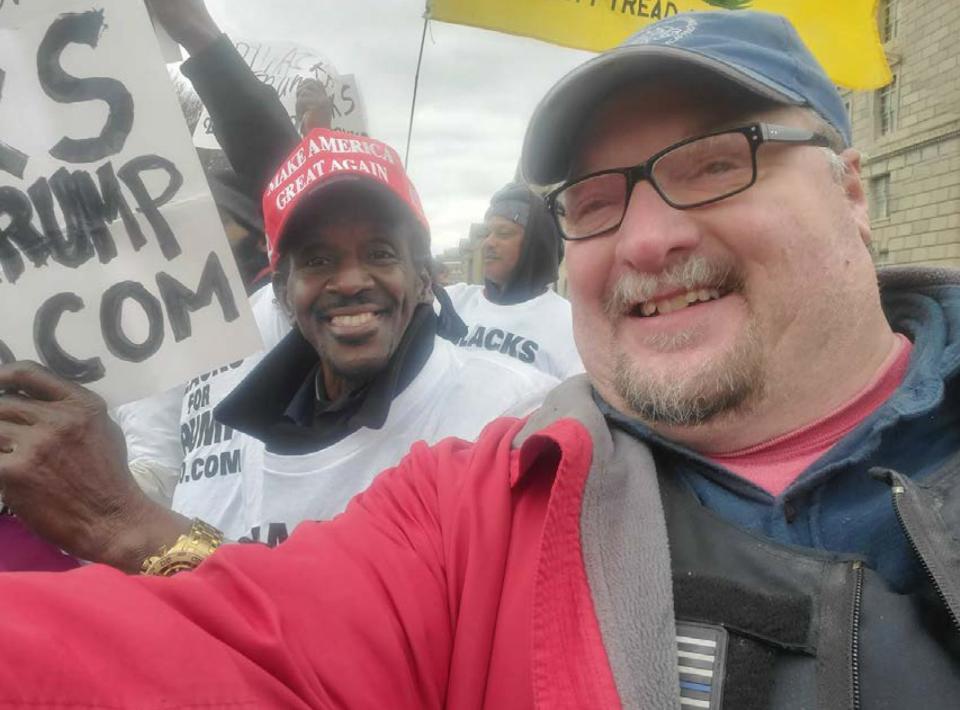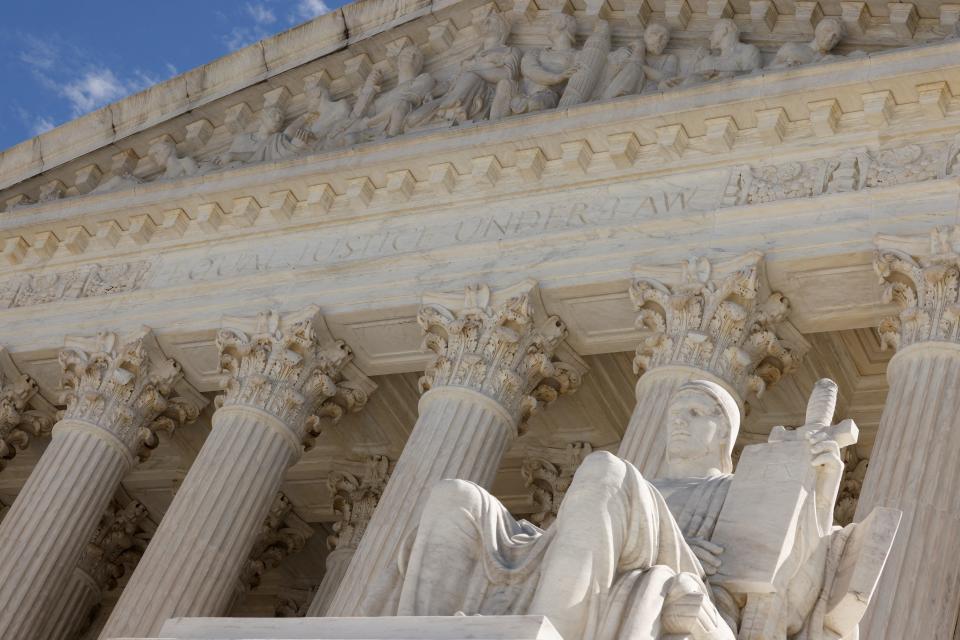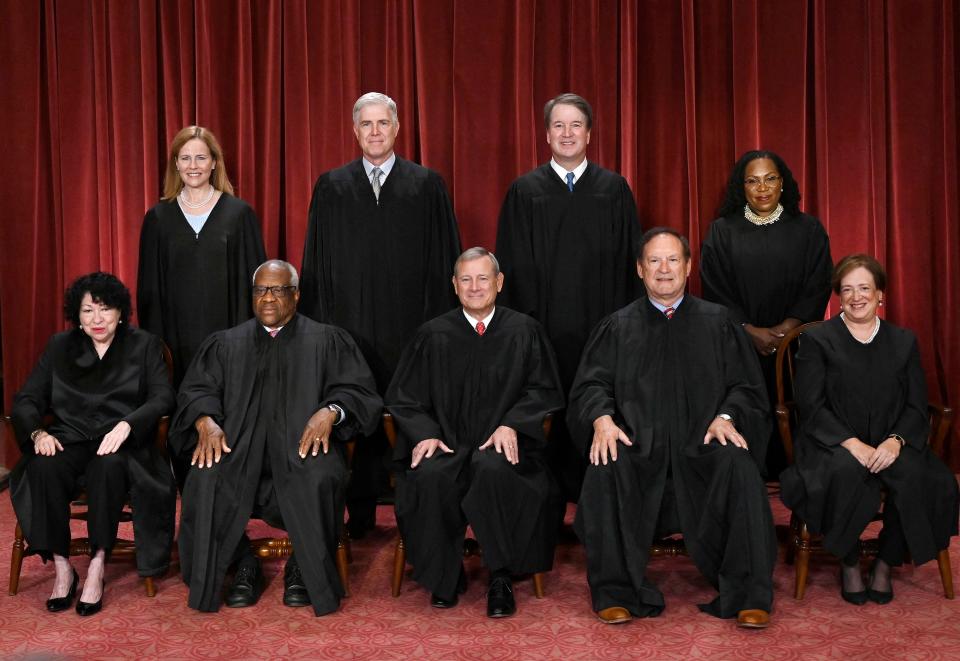Supreme Court orders new review of obstruction charges for Trump and Jan. 6 defendants
WASHINGTON – The Supreme Court ordered a new review of the law behind obstruction charges filed against hundreds of defendants in the Capitol attack on Jan. 6, 2021 ? including former President Donald Trump.
The 6-3 decision in Fischer v United States was highly anticipated because one-fourth of the defendants – 350 of the first 1,350 people prosecuted in the riot – were charged with obstruction. Two of four charges against Trump in his federal election interference case are based on the law.
The high court sent the case back to the D.C. Circuit Court of Appeals, which had ruled that the obstruction law did apply to Jan. 6, to review it again.
"Prosecutors have to prove that the defendant impaired the availability or integrity for use in an official proceeding of records, documents, objects or other things used in an office proceeding, or attempted to do so,” Chief Justice John Roberts wrote for Justices Clarence Thomas, Samuel Alito, Neil Gorsuch, Brett Kavanaugh and Ketanji Brown Jackson.
Justice Amy Coney Barrett wrote in a dissent that her colleagues in the majority "failed to respect the prerogatives of the political branches," including the broad way Congress had written the statute.
"Once Congress has set the outer bounds of liability, the Executive Branch has the discretion to select particular cases to prosecute within those boundaries," Barrett wrote in the dissent, which was joined by justices Elena Kagan and Sonia Sotomayor.
Attorney General Merrick Garland called Jan. 6 an unprecedented attack on the government and said he was disappointed with the high court’s decision to limit the law used to charge hundreds of defendants.
“The vast majority of the more than 1,400 defendants charged for their illegal actions on Jan. 6 will not be affected by this decision,” Garland said. “There are no cases in which the Department charged a Jan. 6 defendant only with the offense at issue in Fischer. For the cases affected by today’s decision, the Department will take appropriate steps to comply with the Court’s ruling.”
Although the impact of the decision on Trump's case is unclear, he called it a "BIG WIN!" in a post on Truth Social.

Trump has said his first-day agenda if he wins the presidency again will include pardoning people convicted of crimes related to Jan. 6. Trump called the prisoners “Hostages being wrongfully imprisoned” in a post on Truth Social.
A former police officer, Joseph Fischer, who was charged in the riot, had asked the justices to overturn obstruction charges because Congress approved the law in 2002 to prohibit the destruction of documents, which he isn't accused of doing. But government prosecutors argued its wording offers a menu of charges for obstruction, including interrupting a public meeting, such as when Congress was counting Electoral College votes to certify President Joe Biden won the election.
What was disputed in the obstruction law?
Congress adopted the law in 2002 after the Enron scandal, when the failed energy firm's accountants were found to have destroyed documents and no charges were available to use against them.
The disputed language in the law prohibits anyone from “corruptly” destroying or concealing a government record, or who “otherwise obstructs, influences, or impedes any official proceeding, or attempts to do so.”
More: A former cop yelled 'charge' on Jan. 6. How his Supreme Court case could help Trump.
Fischer, a former police officer in central Pennsylvania who was charged with obstruction for entering the Capitol Rotunda on Jan. 6, argued the law applied only to destroying documents, not disrupting official meetings of Congress.
But Solicitor General Elizabeth Prelogar, representing the Justice Department, argued the “otherwise” was “a classic catchall” that lawmakers adopted to cover creative forms of obstruction.
Two of the charges against Trump allege he obstructed Congress because the riot interrupted the counting of Electoral College votes for several hours before lawmakers could certify that Biden won the election. The other two conspiracy counts accuse Trump of trying to steal the election through fraud and by violating the public's right to have their votes counted.

Justices had questioned why the obstruction charge was needed for Jan. 6
Several justices had questioned why a felony obstruction charged was needed for Jan. 6 cases.
“What happened on Jan. 6 was very, very serious, and I'm not equating this with that,” Justice Samuel Alito said. “But we need to find out what are the outer reaches of this statute under your interpretation.”
Justice Brett Kavanaugh questioned how such an important provision could be tucked into legislation behind the word "otherwise."
“There are six other counts in the indictment here, which include civil disorder, physical contact with the victim, assault, entering and remaining in a restricted building, disorderly and disruptive conduct, disorderly conduct in the Capitol building,” Kavanaugh said of Fischer's case. “And why aren't those six counts good enough just from the Justice Department's perspective given that they don't have any of the hurdles?”
Gorsuch had asked whether hecklers at the Supreme Court of the president's State of the Union address could be charged.
“Would a sit-in that disrupts a trial or access to a federal courthouse qualify?” Gorsuch asked. “Would pulling a fire alarm before a vote qualify for 20 years in federal prison?”
Prelogar responded that the misdemeanors didn't cover the severity of Fischer's actions.
“Because those counts don't fully reflect the culpability of Petitioner's conduct on Jan. 6,” Prelogar said. “Those counts do not require that Petitioner have acted corruptly to obstruct an official proceeding. And, obviously, Petitioner committed other crimes that we've charged and that we're seeking to hold him accountable for.”

How many Jan. 6 defendants are affected?
Congress adopted the law in 2002 in the wake of the Enron scandal. About 350 out of 1,350 Jan. 6 defendants were charged under the obstruction law. Several justices asked Prelogar why the obstruction law wasn’t used for other violent protests or why misdemeanor sentences of up to a year in jail weren’t enough for Jan. 6 defendants.
“I think it’s in a fundamentally different posture than if they had stormed into the courtroom, overrun the Supreme Court police, required the justices and other participants to flee for their safety and done so with clear evidence of intent to obstruct,” Prelogar said.
Justices asked why the Capitol riot was more serious than temporarily interrupting a trial by shouting, heckling the president at the State of the Union speech or interrupting a congressional vote by pulling a fire alarm.
Prosecutors charged defendants by arguing they knew Congress was meeting and tried to disrupt it, threated violence or showed a willingness to use violence, or brought tactical or military gear, Prelogar said.
What are average sentences in Jan. 6 cases so far?
The main reason defendants challenged the obstruction law was because it carries a maximum 20-year prison sentence. But Prelogar said average sentences have been far lower than that.
The average sentence for a Jan. 6 defendant without a criminal history who committed violence was 10 to 16 months, Prelogar said. The average for a nonviolent defendant was six to 12 months.
Among about 50 defendants whose only felony conviction was the obstruction charge, the sentences averaged 26 months, Prelogar said.
This article originally appeared on USA TODAY: Skeptical Supreme Court orders review of Jan. 6 obstruction charges
